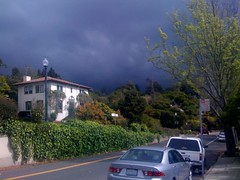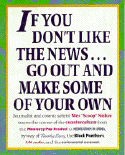
|
||||||||||||||||||||||||||||||||||||||||||||||||||||||||||||||||||||||||||||||||||||||||||||||||||||
We don't have ads on Scripting News, but from time to time I put in a plug for a product I really like. A few weeks ago I got a fantastic toaster oven, and I've been looking for food it cooks well. I picked up one of these DiGiorno pizzas and man they are some good food. It's not Ray's, it's not NY pizza, which is still the best. Yeah it's made by Kraft and it probably is junk food. But it tastes soooo good! Breakage in the new Twitter UI I happy to report that I have the new Twitter user interface on my account and it's nice. However, apparently the "status" param is no longer recognized. http://twitter.com/home?status=thisusedtowork That would put "thisusedtowork" in the "What are you doing?" box. URL shorteners redirect to Twitter with the new shortened address in the "status" param. This change breaks users. Any help would be much appreciated... Update: Just got a direct message from Twitter, they fixed the breakage. That's excellent turnaround. Thanks!! Jay Rosen: "I got put on Twitter's official suggested users list last night. I asked them to take me off it today and they did."
We. Are. What. They. Are. Going. To. Sell.
They call it User Generated Content. We're the users. What do we do? Generate. What do we generate? Content. We're like the bacteria that make beer or yogurt. You put in the basic ingredients and out the other end comes content! It's cooool. It all came to me last night while I was sitting in a theater watching a really bad movie, a remake of a totally excellent BBC mini-series. You can tell it was bad because instead of being wrapped up in the plot or studying how they crafted the movie, I was trying to figure out how they got me in the theater. They got me in with celebrity hype. There were two great stars in the movie. I thought it would be great. I was wrong! I bought two tickets, they got $20 from me, and we walked out it was so bad. (In one scene Mirren walks off stage saying "Fuck you very much," which I thought was a perfect summation of the movie.) Someday, probably very soon, a movie studio is going to rent Twitter for 24 hours to do a special event for their movie. On that day 1/4 of the tweets you see will be about how great the movie is. You think you'll quit, and maybe you will, but a lot of people will think it's cool and they'll buy the product. Marketers love that kind of stuff. They pay big bucks for it. So if you think that having a lot of celebrities doesn't have anything to do with you, you're wrong. The point of celebrities is they say things that everyone hears. That's what makes them celebrities. You may not want to hear it but they're going to say it anyway and in the end you are going to hear it, like it or not.
Kurt Vonnegut described a novel-within-a-novel, Now It Can Be Told by Kilgore Trout, in which the main character is the only real human and everyone else is a robot sent to test him. It's a possibility I have considered. Doing my part to help revive the economy
1. Is there a Linux or Windows equivalent of the Mac Mini? A headless, keyboardless, mouseless computer that doesn't cost too much, that isn't made by Apple. I already have three Mac Mini's, I love them, but I find myself interested in, even lusting for, an Asus EeeBox. Have you tried it? Do you like it? Any other choices? 2. For the same application, I've been thinking about getting a gamer platform, with a really fast CPU and lots of RAM. (An aside, the application is processing lots of text, which involves relatively little net traffic and doesn't require a persistent IP address. No need to pay Amazon $90 per month when I could buy a cheap computer for $300 and be done with it.)
4. Still thinking about getting the FlipCam. That was the thing I didn't buy last time I tried to kickstart the economy. (Update: I ordered the FlipCam today.)
Adjix has a breakthrough idea in URL shorteners
1. Guy asked if I could make the app work with his favorite URL shortener, Adjix. I said I'd check it out. 2. Joe Moreno, the CEO of Adjix, emailed me and showed how to get hit stats from his service, in a manner similar to what I was getting from tr.im. 3. When I tried to deref one of his short URLs I found he was using the meta-refresh technique. I was irritated, why isn't he using the HTTP redirect mechanism like everyone else. He said it was so they could use Adsense to track clicks. Some of his users wanted it. I found a way to work around the issue without having to parse the HTML and then forgot it. (Here's the text of the page they return.) 4. A few days later Moreno mentioned in an email that another advantage is their shortener could be served statically from S3. This hit me like a ton of bricks. Say what! Think about it. When you shorten a URL, what if instead of generating a record in a database that requires a dynamic server to stay up indefinitely, you generated static HTML and saved it somewhere likely to survive the apocalypse. It's not a complete answer to the problem presented by URL shorteners, but it's pretty great half-step. Maybe even a 3-quarters-step. Joe wrote it up here. Jake Jarvis calls this an Apocalypse-proof URL shortener. I like! How to get started with Facebook's new API? I'm reading the docs for Facebook's Open Stream API, with fascination. It sounds like an app can read and write to a user's stream, something like the way one writes an app to access the Twitter status stream. That's something I want to do!
Say I want to write an app to access my own stream. What's the process? How do I give the app permission? What's the endpoint? I assume FQL is Facebook Query Language? What do I do with that? I don't know. I have a feeling these docs are written for developers who have been working with Facebook. I have never written any code to call Facebook's API. If they want to go after Twitter developers (no one is going to like this, but it's the truth) read their developer docs, and make your API work like that. I say no one is going to like that except Twitter developers of course. This is why I say that to compete with Twitter you must start with item #0 in the wishlist.
This week's 40-plus minute podcast with Jay Rosen and myself. To subscribe, add this URL to your podcatcher (or iTunes). The new Walkman is great. Click the pic for comments, a full-size picture, link to the product page.
Now, I'm not saying the people who retweet are stupid, or the impulse to pass on a link to everyone who follows you is stupid, but... A retweet is the same as voting up something on Digg or Reddit. It's a piece of metadata about the tweet, and should be stored and displayed with the tweet. When you retweet something, none of the 140 characters should be used in saying that it's a retweet and who it came from. Digg does it right, Twitter --> wrong. Another app that does it right is FriendFeed. Look at this post, it's been liked a lot. When I wrote this it had 225 likes! Like is FriendFeed's term for retweet. Nothing needs to be done, but I'm glad to get this out there, once and for all. Hope you're having a happy Sunday!
Why there will be many Twitters Yesterday I wrote about the Lotus 1-2-3 of twitters, but it may not be obvious why there will be more than one network of networks -- so let me explain. 1. Twitter is growing fast. 2. Its use as a medium for news has become apparent. I've been saying that for a long time. It's both the front room and back room for news. How it's delivered and how it's produced. 3. Umair Haque suggested the NY Times buy Twitter. Of course it's too late for that. Pretty soon Twitter will be able to buy the NY Times. 4. I think it's pretty obvious that Twitter is on a trajectory to become one of the major media networks, a Turner, Fox, NBC, Time-Warner, Viacom, Disney. When it's apparent to more of the heads of these companies, they're going to start wondering why their stars are on Twitter and not on their own network. 5. The thought has probably also popped into the heads of the people at Twitter. They will try to make deals with some or all the media companies. They have a lot of power, and should be able to cut good deals. But as the negotiations go forward, it will become apparent to the execs that these guys are competitors. They will consider Make vs Buy. If they're smart, they'll do their deals with Twitter at the same time doing deals to get their own network going.
There's a lot of money to be made in these networks and it costs so little to start one. An average Hollywood film costs two or three times as much as all the money Twitter, Inc. has raised so far. Spiderman 3 cost $258 million. That's just one movie. And over time the cost will come way down. That's why I suggested that FriendFeed get a clone ready, now -- so they can do deals with the media companies when they're ready. Which might happen any week now, if it hasn't already happened. Remember, it's not Kansas anymore, the house fell on the witch and Ev and Biz are wearing the Ruby-red slippers. Click your heels three times and say "There's no place like home." Yours truly, over and out, Dave
The Next Killer App is to Twitter as 1-2-3 was to Visicalc
First a very brief story of what Visicalc was and how it was surpassed by 1-2-3. And please understand this is my version of the story, I'm sure all the principals will have their own versions. Visicalc was god. It was the Twitter of the early 80s. It was credited with creating the personal computer boom led by the Apple II. The product was created by the two Dans and Bob. Mitch worked for the company. Everyone said Mitch wrote spaghetti code. The two Dans and Bob didn't take him seriously. They were gods after all and Mitch was a mere mortal. Along comes the IBM PC. It's a private thing, but since Visicalc rules, they got early access. The two Dans and Bob and Mitch all saw it. They started to port Visicalc to it, but didn't do anything special. After all, their software is what made the PC boom. The IBM PC would be just another Visicalc machine. Mitch didn't see it that way. So he got together with a brilliant coder, Jonathan Sachs (so much for the spaghetti code!) and got money from a very smart man in NY, Ben Rosen, and started Lotus to make 1-2-3. The two Dans and Bob knew about it, but they didn't take it seriously, because they were gods and Mitch writes spaghetti code. But the one thing they didn't figure out about Mitch, that made him such a killer, was that he used the product so he knew what features would be most valuable to other users. Not saying the two Dans and Bob didn't, I'm pretty sure they did, but Mitch was really tuned in and watched users get confused and hung up with Visicalc, so he knew what to focus on for 1-2-3. I don't know for sure, but I bet the Visicalc team didn't really listen to Mitch.
So somewhere out there is an idea for Twitter that, like 1-2-3, will represent the future, leaving Twitter to own the past. The challenge for brilliant software designers everywhere is to figure out what that is and to do it! I've been studying it as long as anyone, I started using Twitter in the summer of 2006, and have been puzzling it out every damned day, waiting for Twitter to give me something new to sink my teeth into, and I'm convinced it's going to come from a Mitch-Jonathan-Ben combo out there, not from the original team. Probably for many of the same reasons Visicalc didn't rise to meet the needs of experienced spreadsheet users. Here's my wish list: 0. It starts as an exact Twitter clone. Command for command. Then see item #2. I get to completely redesign the UI. 1. I want to start my own Twitter, for free. You host it for me. Anyone can join. 2. I have to be able to edit the template, fully, so I can make it look like my blog. This will allow designers, for the first time, to tinker with the look and feel of a Twitter. They played a big role in the blogging bootstrap, but have mostly been sidelined by the emergence of Twitter. 3. I want to map my domain to it, so it's part of scripting.com. 4. It's gotta be fast! 5. Lots of prefs that determine who can join, what they can do, various editorial roles. If you used Manila, I want to be able to delegate to managing editors and contributing editors. 6. Easy hooks into Disqus (and competitors) so each tweet can be the beginning of a conversation. 7. Plug-ins that hook into the UI so I can add commands to my Twitter, without modifying any source code. 8. The ability to attach a picture, movie, MP3 or any arbitrary data to a tweet, basically the same power as the RSS 2.0 enclosure element. 9. Full data portability. I've got to be able to run a script on my desktop every night to get a complete XML-based backup of my community.
See, that's what I really think Twitter is -- a Network Construction Kit for Real People. Sort of a Tinker Toys or Lego for networking. We've gone a long way with a few simple pieces. We need some more stuff to play with. It's always like this, in every layer. At first we need training wheels, and a tech company to provide the whole package. Then we get comfortable with the technology and we want to order a la carte, to design our own meal. You can try to contain the users, lots of companies have -- but it never works. If this blog is about anything, it's about that -- documenting the never-ending cycle of tech booms and busts, bright new days, and endless platform wars, starting in 1994. It's all so predictable, you'd think one of the rising stars would figure it out and plan accordingly, but it seems they never do.
I feel the need to make so many disclaimers here. 1. Yes I have been critical of Twitter. 2. I am not on the Suggested User List. 3. I think they're making really big mistakes in managing the community. (That they are even managing the community at all is a bad sign. They should be trying actively to stay out of managing it.) 4. And about a million other things. But...
In the last week they've been fighting security issues, hacking, and a huge influx of new users. Any one of these things would be pretty taxing, but all at the same time -- well, it's gotta be hell on their side of the interface. I've been watching the communication, and I think they're doing a really good job of explaining and their intentions are good. That doesn't mean I don't think they brought on the stress themselves or that I support other things they're doing. I don't expect to be on the SUL, and I don't want to be. I'm not saying this to kiss up to them. Let's all try to be fair. That's my point.
Today's Morning Coffee Notes podcast
Also a response to Kevin Marks and Steve Gillmor who, in comments, asked me to clarify a blog post about mixing data with Facebook and/or Twitter structures. Mystically they all seem to relate. Finally, a tribute to the hippie-surfer culture of California. PS: You can subscribe to this podcast in iTunes. It's the second command in the iTunes Advanced menu. Paste this URL into the dialog that appears and click OK.
Twitter and OAuth, interesting brew
Now it would be great if: 1. Facebook would make OAuth their default way to hook into their identity system. They have the power to ratify this as a standard. If they do, everyone who follows will have to use OAuth. I'm not crazy about OAuth, but one way of doing something is better than two, no matter how much better the second is. (That's a version of the brilliant always-applicable Postel's Law.) 2. One or both of them should swallow hard and use some of their investor's money to provide developers with an open storage system to go along with their OAuth support. This is the YouTube-like opportunity of 2009, the first to do it will get all the developers building on their platform and will set a standard as powerful as HTTP (if it's as simple as that, which it could easily be). This goes along with my longtime request for Payloads for Twitter, it's what we're all waiting for, in order for Twitter apps to stop being the demos they are, and start entering killer app territory. The sign of a platform, its gravitas, macho-ness comes from the possibility of developers eclipsing the platform itself with utility and coolness. If you look back at all the really successful platforms of the past they all had this quality. The Apple II had VisiCalc and Choplifter. The IBM PC had Lotus, dBASE, a host of word processors. CP/M had WordStar. Mac had Pagemaker and Quark. The web had Yahoo and Google, Blogger, YouTube, eBay, Amazon, Skype and on and on (probably the biggest and best platform so far). Maybe it won't be Twitter or Facebook, but whoever builds the next consensus platform will have open data storage APIs in addition to identity. It's a vital part of identity. We've been waiting too damned long for this. A source of inspiration: Jon Postel I love doing the weekly podcast with Jay, because he's so damned smart and he surprises me with his stories. Not many people do that as well as he does. This week his surprise was the idea that we could tell stories of inspiration to help get over the hurdles the future is throwing in our path. His example of Max Headroom was brilliant and new to me, I didn't watch the show in the 80s, I was too busy running my always-on-the-brink startup.
"Be liberal in what you accept, and conservative in what you send." People keep trying to break the law, but when they do, it always ends badly. Maybe someday they'll stop trying. I suspect when the fullness of the new Land of Journos reveals itself it will also be an instance of Postel's Law.
Rebooting the News podcast for April 19 To subscribe, add this address to your podcatcher: A bit of housekeeping -- the podcast now has a name -- Rebooting the News. Perfect name, cause it's got the technical side with rebooting, and boot is the first part of bootstrapping. And News is what it's all about. I hope you enjoy this show!! We're going to start recording our weekly podcast in about 20 minutes at 6PM Pacific, so I have to hurry up and put my notes together! I love a deadline. I loved this classic exemplar for Jay's Curmudgeon Studies J-school curriculum, esp the part where he says that some (huge) percentage of everything in the world originated in his word processor (I'm exaggerating). The exact quote: "Several studies have shown that more than three-quarters of the news you see, hear or read anywhere is at least derivative of something that originally appeared in a newspaper." I have a very neat rebuttal -- 100 percent of everything you read in a newspaper originally appeared in the world unless they got it wrong, which happens far too often. The sources originated everything Mr. Brinkley -- and last time I checked -- we don't get paid bupkis, so that part of the news system should make the transformation pretty well. I watched Bill Moyers on Friday, he had David SImon from The Wire who is a great writer, but contradicts himself when it comes to the Baltimore reporters. In the first part of the 50-minute interview he says that the reporters never really got the story and were' never effective. But in the second part he says the opposite, and laments their failure, though he doesn't blame bloggers, that's the least of it. The problem with all the curmudgeons is that they stop at hand-wringing, no one wants to talk about next steps to reboot the news. As you know if you're a regular listener to the podcast, I think we're far along in the reboot. I want to talk about the 40-twits app, and next steps. Briefly about my visit at Nieman in Cambridge last week with Josh Benton and Zach Seward. I want to talk about Oprah joining Twitter, and what might be coming next. And of course I want to talk about whatever Jay wants to talk about. Jay's 40-twits page actually just has 20 for now.
Now this is what I think, not a proven fact in any way. Twitter is the current holder of the baton in a series of social media bootstraps, each of which built on what came before. It is not Google, which is a search engine, rather it is what came after MySpace and captured its growth. Extrapolating, something will come along and do to Twitter what it did to MySpace. Before all that there was LiveJournal, blogging, podcasting, Flickr, etc. Depending on who you ask different things came first. If you ask me, blogging came first, and it had the longest ramp. I saw podcasting grow at a much faster rate simply because the blogging network already existed and was used to promote podcasting. Just for fun, I drew my own Gartner-like diagram: Dave's Continuous Bootstrap. It would be foolish to believe that Twitter will not have a successor. And I'm pretty sure it'll grow faster than Twitter because word of its existence will spread on Twitter. That's why all this is a bootstrap. You can use iteration N to spread word of N+1. Google is a search engine. A completely different beast. I don't buy that Twitter is search. Most of the stuff that you see on Twitter isn't worth finding. Try searching for something in the news and see if you don't agree. It's easy to conduct an experiment. So what's the relationship betw Google and Twitter? For sure you can put ads on Twitter, just the kind of ads that Google loves to put on email or web pages. They can tell a lot about you by knowing who you follow and maybe who follows you. But Google is also a search engine, and I believe there's a connection there as well, but only when you push links through Twitter. You can view that as contributing to PageRank. Will this make search better? I have no idea. They'll have to try it. Maybe Twitter is working on it. If they'd open the firehose to developers (and not the limited firehose they're promising, the full thing) we could find out without waiting.
Anyway, just some random thoughts on my first Sunday back in Calif. PS: It's impossible to take anything TechCrunch says about Twitter seriously. Like Mashable, they are on the Suggested User List and have received a massive influx of new followers as a result. It seems a very likely explanation why they make fun of those who criticize Twitter, or in Lacy's case, urge them to go easy. It's as if they do PR for Twitter.
Highdef scoreboard at Citi Field Click on the pic for more detail, there's lots of pixels. And compare with this picture of the defunct Shea Stadium's mostly analog scoreboard taken three years ago, before they tore it down. What I learned about being rich Interesting piece in the NY Times magazine about Twitter and how connectivity is for poor people. I learned about this when I made enough money in the late 80s to realize what wealth buys -- distance. Then it took a few years to learn that distance is not what I wanted, in fact I don't think it's human to crave distance. People are built to want to be among others, at least I was. I bought a house with a 750 foot driveway in the middle of the woods. My neighbors built houses the size of high schools. You couldn't walk anywhere. Now I live among humanity, much more modestly and I'm happier. So it may be true that connectivity is for the poor, if so, the rich aren't happy. Hefernan is right to bring this question to Twitter, because it is the struggle it's going through, as classes emerge. It won't be like other class struggles though, as the rich and powerful strive to make sense of Twitter, they will encounter the contradictions of 21st century decentral communications. Oprah hasn't really come to Twitter yet, it'll be interesting to see if she ever really does. An interesting experiment for her, if she ever has alone-time, create an account that isn't attached to her media persona and mingle with the common folk, be one. It's got to be the rarest experience for someone so instantly recognizable. A way to collapse all the distance, to communicate with people who aren't employees, who don't want anything from you. Then when she sells the Twitter experience, if that's what she's doing, she'll have some idea what she's selling. I have a feeling Oprah could be a good rep for Twitter, but not if she does it from inside her bubble. Then she'll miss the whole point. Its value is not only as a promotion machine, I think -- there's value elsewhere. BTW, Paul Boutin reports that the media backlash against Twitter is beginning. He says it's fake, but everything about the media is fake, so it's as real as it gets. I don't think too many early adopters will come to their defense when the media turns on them. I never wanted to help build a network that would be turned over to the mainstream guys. I heard second-hand that Ev "isn't building a network for Scoble." Too bad. I think someone should. And someone will. Scoble is one of the most real and honest and effective evangelists anywhere. I think Ev will come to regret his snobbery. At least I hope so. At breakfast this morning I found a way to explain my feelings about this to my mother who is a regular watcher of the Oprah TV show. She reads many of the books and uses products Oprah recommends. My mother was also a strong supporter of Hillary Clinton for President during the primary, and Oprah campaigned for Obama. I said that's how I feel about Twitter. I didn't sign on to help build a network for the big media, just as she hadn't supported Oprah so she could use the power to help Obama against Clinton. That's why Oprah probably came to regret being so vocal during the campaign, and why Twitter the corporation will probably regret that they took sides here. A new kind of media is booting up, and Twiitter should have been a leading proponent of it. Okay if the big media types want to use it, no problem -- but don't go on their shows and support them over the individual users. You're just inviting backlash. I had the priviledge of going to the new Mets ballpark in NY last night. The Mets won in an uncharacteristically elegant way. Bottom of the ninth, bases loaded, Luis Castillo hits a bullet deep in the pocket betw short and third. The Brewers shortstop makes the play, but it's hit too fast and makes him turn too far. Castillo beats the throw at first and the runner scores from third. The team, excited at the thrilling finish, runs on the field and piles on the baserunners. Everyone at the new stadium had a nice but uneasy feeling. Too many people greeted us at the entrance. Everyone smiled more than seems right for New Yorkers. Try as hard as they could, no chant of Lets Go Mets took hold in the crowd. At the beginning of the game I was enchanted, by the end -- it didn't gel. No suspension of disbelief. I've traveled a lot in my life and I've seen the Mets play a lot of away games at foreign ballparks. That's what this felt like. I felt like a child whose father has a new wife being asked to accept her as my mother. It just doesn't work. In the end I would have much rather gone to a game at the old Shea Stadium, warts and all. Baseball is all about tradition. It's not an exciting game like basketball or football, it's a game where the past matters. I'm sure the people who run NYC had their reasons for wanting a new ballpark. Maybe it would have worked better if they had put it somewhere else, but with the ruins of Shea still visible from the new stadium, it feels like we haven't had the proper period of mourning, at least, for an old established shrine of our religion. Would the Boston Red Sox tear down Fenway, could the Cubs exist without Wrigley? These questions have obvious answers to me, as obvious as whether the Catholic Church would tear down the Vatican just to get some skyboxes. The new park is a beautiful stadium. I'm not saying it will never fill the place of Shea Stadium, but it doesn't now. I miss the old place.
Random thoughts over morning coffee
Doc Searls likes to say that markets are conversations, but people are conversations too. I have no way of knowing for sure how it is for other people, but inside me is a constant back and forth chatter, with lots of different voices, each expressing opinions of minor and major events that take place all around us (i.e. me). It's all those different voices that come up with ideas, collaboratively -- we're like a 24 hour group brainstorming session. The sticker on the back of my computer says MEAN PEOPLE SUCK. Maybe not such a great sticker. I find it attracts attention, but not many comments. I've seen people leer at me, not sure what to make of it. The stupid thing is they all seem, at least to me, to be mean. I imagine the conversation that never actually takes place to go like this: Is that about me? asks the mean person pointing to my sticker. I say "Sure I knew I'd run into you in the cafe or airport even though we've never met and I wanted to be sure I didn't have to talk to you, now go away." I think maybe I'll look for a new sticker! Had a thought maybe FriendFeed ought to put a layer on their app to make it a blogging tool. They'd still have the UI they have now, but it would be a back-end. Then I could use it to host a blog with comments, sort of an alternative to wordpress.com. If I were them I might go this route if they're getting tired of being compared to the Twitter juggernaut. Maybe they could be seen as breathing new life into the blogging market, making it more "real time" perhaps. One of the reasons I don't like reading newspapers these days is that they're all about Twitter. I'm so tired of hearing how great Twitter is. It's a sore spot for me, cause they get all the glory, and there's nothing but boredom for me, a two-plus-year tireless Twitterer. I used to feel Twitter was exciting. Now all the news on Twitter is about how much money they're worth, and how many followers some Hollywood asshole has, and isn't it funny that CNN didn't even know they didn't own the CNNBRK account, and isn't it even funnier that they got all those followers from Twitter putting them on the SUL and how much you want to bet they didn't know it wasn't really CNN behind it either. I shake my head. It's so seat-of-the-pants. They run a nascent media empire like it was Biz's personal blog. Where do I fit into their big plan? Nowhere. Obviously. It totally reminds me of the time when Netscape ruled the browser biz. We need at least a two-party system. This thing is dying. I know it doesn't seem that way to the company and its investors, good for them. But it sure feels that way to me. You do understand that a blog is a personal thing right? Your mileage may vary and you may have a different opinion. I'm under no obligation to see it your way, and vice versa. Anyway, I'm having a fine time on this east coast schmoozing trip. The weather is pretty good, kind of cold for mid-April, but it's not raining, and the crispness makes it nice to walk around, and I'm doing lots of that. I met a future President of the United States yesterday (he's still just three months old). I have a few meetings in Cambridge this morning and then I'm on the 3PM train from Boston to Penn Station, and tomorrow night I get to see the Mets play in their new stadium before heading back to Calif on Saturday morning.
Twitter is at least a dress rehearsal
When I took a picture of the shark tank at the NY Aquarium, or the Cyclone at Coney Island or the traffic on the Belt Parkway, I had a background script on my server that automatically published a pointer to each picture to Twitter. I feel the pictures are more interesting because people see them while I'm still there. It's a very small window into my mundane life. I post them not because I think anyone cares about my life, rather because I want to see what ideas it gives me for next steps. In a way, as a user of Twitter, I have the same business model as the investors in Twitter. I don't know what it is, but I have a feeling there's something here. I look at it this way, if you tried to tell me what we're doing on Twitter has nothing to do with what we'll be doing with networks in the future, I'd be 100 percent sure you were wrong. There's something here. The challenge is to figure out what it is. However increasingly I'm sure that Twitter itself is not it. If it were, by now we'd see one killer app built on Twitter that was as game-changing as Twitter itself, if not more so. I think this is because they have put limits on what developers can do, trying to save the good stuff for themselves. The danger in doing that is that you leave nothing juicy for developers. And you leave the door open for a competitor who will take advantage. Things I'd like to see -- unlimited, open architecture metadata hanging off the 140-character messages, payloads for Twitter. And open access to the firehose by anyone who wants to develop on it. Both these things would guarantee Twitter, Inc. a role in the future. Without giving up control of both, they leave opportunities for others and make it more likely they will be a stepping-stone. BTW, I was able to finish this post on my 1000HE on the Jetblue flight while it was waiting at the gate. The free wifi from the terminal is strong enough to be accessible on the plane. It's amazing how quickly you can write when you're under deadline! Update: Early-on I compared Twitter to a coral reef. I think the analogy is more apt than ever. Update: An example of a competitor completing the promise of a disrupter: Netscape's browser was only sort-of free. They looked the other way when people downloaded it without paying for it. When Microsoft came out with their browser it was totally free. Netscape's complaint that this was unfair rang hollow. Marc Canter's vision/nightmare come true 15 years ago Marc Canter was a cashed out ex-founder of a Kleiner Perkins startup, rushing through his money in the lifestyle of a rich and famous rock star Hollywood movie mogul. It was a huge bonfire, built around a spectacular vision of commercialism, entertainment, network technology and physical venues like bars, football stadiums, bowling alleys and restaurants. Marc turned his house on Potrero Hill into a demo for his vision. I'm writing this from the JetBlue terminal at JFK which is a total realization of the vision. And I totally hate it! In front of me is a HD video screen I'm trying hard to ignore, but it won't let me. All around me are similar screens with people sitting around them trying to ignore them. Hanging off the ceiling everywhere are more HD screens showing sports, news, commercials, schedules announcements. Off in the distance is a ruckus of a central hallway, total confusion, people unable to figure out even the most basic things like how to get a coffee and blueberry muffin. I don't dare go into the men's room! On the monitor in front of me is one of Marc's favorite ideas. I can swipe my credit card and go to a menu where I can choose from all kinds of food that they will bring right to where I'm sitting. I didn't try it. In a few months I'll probably love this place, but right now -- I'm Mr. Luddite. Give me a plain Jane terminal anyday! Update: On the other hand, one thing everyone who reads this blog will appreciate -- free wifi, and it's good.
This week's podcast with Jay Rosen I spent 40 minutes this evening talking with Jay about news, tech and the future of journalism. As always it was a great learning experience with the NYU journalism professor. A frequently asked question -- what feed should I subscribe to to get the flow? The answer -- the feed for Scripting News. When I do a podcast it's included as a standard RSS 2.0 enclosure. At the end of the show I promised to create a room on FriendFeed to post links to stories we'll discuss on future shows. Does Mashable have credibility re Twitter?
Cashmore is one of very small number of users who Twitter includes in their Suggested Users List, which has resulted in huge growth in their number of followers. Three months ago, he had 28,621 followers. Today he has 417,347. In the same timeframe my Twitter feed grew from 16,062 to 21,108, which represents something of a baseline for users not gifted by Twitter with placement on the SUL. (Source: twittercounter.com.) Did Twitter favor him with this gift because they like what he says about them, or to encourage him to be more favorable in his writing? Or some other reason? Did he pay for this placement? (Note that would, imho, be the ethical thing to do, and the same deal should be offered to everyone.) Would Cashmore withhold or temper criticism of Twitter because he fears they may cut him off? Would a reader question his impartiality? (This reader does. I can't see how he can help but be influenced.) Does this kind of favoritism hurt Twitter as a medium for journalism? Another question will likely come up at some point -- Will Cashmore have to pay taxes on this gift? It could turn into a pretty big liability, even in a non-ethical sense. I wrote about this previously on March 12.
There must be some way out of here, revisited
There's been an interesting discussion that started on Twitter but developed in FriendFeed, about historic parallels, wondering if Netscape was to Microsoft as Twitter will be to Google. I reserved judgement on BSG, I think I have to watch the whole series again to figure out what it was about. There's some stuff I don't understand, for example, at the beginning they make it plain that humans created the Cylons, in relatively recent history, but as the series progresses they go back further in time, and it seems there were Cylons long before humans had the technology to invent them? Weird. But I'm sure there's an explanation. Maybe you can offer a clue in a comment? Anyway, I'm halfway through the first part of the opening miniseries, and as the bombs were going off, as Caprica is being destroyed, Balthar says: "There must be some way out of here." Holy Hannah! I stifled a shriek when I heard this (it would be unbecoming for a person of my stature and girth to shriek). What craftwork. Even if they went back and watched it and decided to make Watchtower the theme song, or if they planned the last episodes as they were writing the very first one -- it's amazing continuity and attention to detail. Now I really want to watch the whole series again.. Anyhow, I'm totally loving the 40-twits project. I'm looking for two or three other prolific Twitter linkers who cover tech and politics to join our little club of curators. Be sure to say what your Twitter account is. I have lots of ideas for continuing the development. It feels like a project with legs.
1. Yesterday was a rough day because the tr.im service had a lot of outages and that made my 40-twits app unreliable. But it's now updating consistently, so I hope the worst is over. 2. I've added a second user, the prolific linker, atul. His report is here. He's an amazing guy, if you're on Twitter and you like tech news you should follow him. He's the source for a lot of the links on TechMeme. He's also a joy to work with. 2a. I call his site AtulMeme. Which led me to call mine DaveMeme. Maybe I should call the software MemeMeme? 3. The fact that I have a second user is kind of a big deal. That means the software has been generalized, so adding the third and fourth user and so on is easier than it was to add the second. 4. I added another column -- RT -- for retweet. When you click on it, no surprise -- it directs you to the Twitter home page with status box pre-populated with a retweet. Easy.
Mike, who used to be my friend and my lawyer, and who believe it or not I still feel affection for, said about me: "Credibility = Shot. Permanently." When I read that I felt like Mike was aiming an ethical bullet at my head. Luckily I was wearing my bullet-proof helmet that day. I wanted to let the accusations settle in before responding in detail. This really was between me and the users of my product, and possibly people who read my blog. After giving it some thought, I believe we should have disclosed that Adam paid us for inclusion in the OPML file, and we didn't. I apologize for that. I explained further in a post on FriendFeed, earlier today. Journalists need to learn about bootstraps New 36-minute podcast explains why New Journalism won't appear in a big bang of epiphany; but will boot up, iteratively.
In yesterday's piece about the AP fighting last century's battle, the big story is not that AP has missed the Internet opportunity of the 21st century, it's that everyone has. No one, and I mean no one, has the site that everyone goes to to find out What's New Now. The holy grail is the What's New Now page for everyone. The place we go to find out what's happening in the world. Someone will crack that nut and make the NYT, CNN, Google, Facebook and Twitter look like stepping-stones. My point yesterday was that, in theory, it could be AP. Too small a point.
AP is fighting last century's battle
That said, it took me a while to come to some conclusions on their mysterious new "strategy" for doing online news. Here they are, in no particular order. 1. It's a Hail Mary pass. Financially, things are looking terrible at AP -- as at other news organizations. There's a general downward trend in the economics of news, and that's amplified by the downturn in the economy. If we could see AP's balance sheet, we might conceive of something desperate ourselves. 2. So their response, near as I can tell, is to renegotiate their deal with the Internet, Google primarily, and change the unit of content they share. Instead of it being a "story" they want to share topics, much like Mahalo. And it's likely to work as well as Mahalo, which is to say, not at all. Here's why. Google is a search engine for people, and people know what they're looking at when they see an SEO-optimized page. They correctly conclude the page wasn't designed for them and hit the Back button. Google, whose indexing algorithm does its best to emulate a human being, isn't fooled by such simple attempts to fool it. Maybe at first, but they soon catch up. You don't see many Mahalo pages in the top search results on Google, and you won't see many AP category pages either, nor should you. Yesterday, Google CEO Eric Schmidt told the news people to think about their users and what serves them. He was giving them good advice, and it's likely advice he gives his own people, including the people who write their search algorithms.
4. I've said it many times before, no one seemed to hear, so I'll try again. Focus on what you love about news, and then bring more of that to the insatiable users of news. If you're making people happy, they'll find a way to keep you doing it. It's like Napster in 2000, the music industry was complaining while millions were freshly excited about music, for the first time in 25 years. People were talking about music on airplanes, in supermarkets. There had to be a way for them to make huge money from that, instead they tried to stop it. AP -- same thing, now in 2009. We love news. We don't love what the cable networks are providing us. The papers are folding. Get on top of the Internet, don't try to crawl under it. Best advice I can offer.
I did a quick 1/2 hour podcast with Chris Brogan this afternoon about "100 Twitters" -- a topic we have both recently posted on. Confusing the cause with the effect
They could also react to the changes, instead of waiting for the wave to roll over them. Don't brace yourself against the wave, that doesn't work -- it's better to be limber and be ready to surf. I once described the change as jumping out of a plane with no parachute. The chances of a safe landing are virtually nil. The challenge is to prolong the ride, and to have fun while rushing to your demise. I once wrote: "Fifteen years ago I was unhappy with the way journalism was practiced in the tech industry, so I took matters into my own hands. And then dozens of people did, and then hundreds followed, and now we get much better information about tech. It will happen everywhere, in politics, education, the military, health, science, you name it. The sources will fill in where we used to need journalists." This didn't in any way put even one reporter out of a job. The reporters were going to lose their jobs anyway, as people's attention moved to the net and away from papers, and the news organizations braced instead of surfed.
Same thing happened in my industry, software development, when I was in the middle of my career. Most of the stuff people use now is either free or very inexpensive. I used to earn my living by selling packaged software that costs between $99 and $249 per copy. It was all less capable than the software I give away these days. I give it away because I am a software writer. I can't not write software and feel fulfilled. But I share the frustration of today's writers. I've lived it. Even so reporters look for scapegoats -- and increasingly I am one of those people. So be it. I started claiming the title of Most Hated Person on the Internets, and life got a lot easier. If hate makes you happy -- enjoy. I've also put free ideas out there that might help with the aggregation or curation of news, which are now super-hot topics, but areas I have been active in for about 12 years. Maybe if instead of villifying me, you did more listening, we could fly together instead of falling faster? Just a thought.
I tried a lot of experiments with links, but they all came up short. Either I didn't have enough people following to create critical mass, or the attention span of Twitter users is too ephemeral to make it worth the effort. You could see it in the read counts of things I point to on Twitter. In the first few minutes there would be hundreds of hits, then the traffic would fall off immediately. For most people Twitter scrolls fast, it seems a waste to put much thought into linking, because it doesn't seem to generate much thought. Now I think I've hit the sweet spot, for a variety of reasons: 1. No special feed, the links go out to my main Twitter account, so the most people see them. This means I have to be the only editor. The feed has my name on it, so the links come from me. 2. I have a very sweet editorial tool. It's so simple and effortless I actually look forward to pushing a link cause it's so much fun. 3. The links are not ephemeral, they accumulate on a page of the 25 most recent links ranked by the number of clicks, thanks to the facility of the tr.im API. I find myself going back to that page as part of my rotation, along with GMail, Twitter and FF -- I want to see how each topic is viewed by the people following the flow. There are real differences. A link to me singing Green Acres with Amy Bellinger didn't rank so high (shame cause it's funny) but a Lifehacker article about running Ubuntu in a Window on Windows ranked very high with over 1000 clicks over a long period. Clearly this link was passed around. I think more people are going to tune into this list, esp as I branch out and do it for other prominent Twitter linkers, and it gets included in something bigger I'm playing with.
I (still) want a toolkit to make twitters
A number of people including Steve Gillmor, Robert Scoble and Mike Arrington did go, presumably because they care more, and because they live closer. I might have gone if it was a BART ride away in San Francisco. Or if I had a business reason to be there. Where I'm at with FF. It's in the chrome of my browser (Firefox) and it's part of my regular rotation, including GMail, Twitter, FOD, Top25. It's where I go during pauses in my daily work to see what's up. I don't leave it open and let my eyes drift over there for a distraction while working on other stuff. If I did, I'd never be able to concentrate. Right now, in April 2009, I'm looking for a way out of Twitter. I don't like the way the company is managing it. Reading the tea leaves, which is all I have to go on, it looks like they're either going to become the current day equivalent of a TV network, or acquire or be acquired by a TV network. I might have been interested in this last year, when I was watching MSNBC 12-by-7 (gotta sleep and eat) to keep up on the election news. This year, I never watch the news. I can't even be bothered to watch the Sunday news talk. Too much nonsense, it's all too irrelevant to everything.
I still want a toolkit to make twitters, so we can try out lots of ideas without having to build and run a back-end. Given the state of the economy, it's pretty clear not many people are going to get the chance to build one, and Bret and Paul know how to, and I wish they'd swallow their pride, and get to work on the ultimate twitter toolkit. There's still a chance that's what they're doing, as far as I know they haven't revealed any changes to the API to go with the UI changes. When they do I'll probably have more to say.
I have a new publication that I produce in collaboration with the people who follow me on Twitter, and the people who follow them, etc. It's really interesting from a human standpoint and also from a tech standpoint. But first, here's the end result: http://twitter.scripting.com/daveTopLinks.html It's updated every five minutes. The list contains the last 25 links I've pushed through Twitter. How fresh they are is a function of how active I've been. Right now the oldest link was posted 30 hours ago. They are ranked by the number of times they have been clicked on. So if they are retweeted with the link intact, the clicks on those count. If someone clicks on a link from the toplinks page, that counts too. So it's collaborative, and the ranking tells you something about what people who are in my cloud are interested in. Tech news ranks high. Not sure what other conclusions to draw (too early). A top link gets about 800 hits. How it works -- I have a little web app behind a bookmarklet that makes it easy for me to post a link to my twitter account. Here's a screen shot. It shortens the URL with tr.im, which has an API that I call every 5 minutes to find out how many clicks each link has received. My app generates the report and saves it to Amazon S3 which is where twitter.scripting.com runs. I think of it as a "Personal Digg." I nominate the links, everyone determines how they rank. It might just catch on.
Hey Sulzberger, there's money over here I was talking with Scoble on the phone today, and said some things there that bear repeating here. 1. I wasn't happy in the 90s with the way Microsoft reacted to Netscape and the web. I thought they were being too aggressive, great creative stuff was happening -- we didn't need a destructive force. I liked how the web broke away from the tech business, I didn't want it to get sucked back in. Microsoft tried, and for a while it looked like they had quelled the rebellion, but then it broke loose again, for good.
3. Japan can lay broadband pipe for $20 per houshold and it's much faster than anything we have in the US. It costs us $800 per household. Maybe we should steal a page from Microsoft's playbook and start getting aggressive in ways that would have frightened me in 1995. As a country, we need to be more competitive. Start right there. Bluntly: Why can't we lay broadband pipe for roughly the same price Japan does? 4. Maybe Bill Gates should offer his services as a competitiveness consultant. Josh is right, URL shorteners are risky
Joshua Schachter writes today about their dangers. We need to prepare for the day when N of the URL shorteners go out of business. When that happens a large part of the web will die. It will not be a good day. Plan on it, like we should have planned on housing prices turning down, and the economy falling into depression as a result. Plan on it like we should plan on the polar ice caps melting and the oceans rising 100 feet. Let's get used to planning for the obvious failures in our future. We're going to get good at it, or suffer. One easy way to lower the cost of URL-shortening is to use our own domain names in place of tinyurl.xom, bit.ly, tr.im, et al. Any one of those services could take the lead here by allowing for that. Let me map my own domain onto theirs, easily back up all my data, and give me the ability to switch services when I want, or when I need to. PS: Twitter could fix this problem right away if they wanted to. Jason Kottke explains how. Why people care how Twitter makes money First a story.. I went to grad school in Madison, which is a great place except in the winter, when it's realllly cold. But it's still great then, if you know what to eat. You want to fill your stomach with something dense and warm. There was this place down the street from where I lived that served something called a Myles Teddy Wedger. I have no idea how it got its name, but it's a pastry, filled with meat, potatoes and onions, served really hot. You could buy one of these and carry it to class with you, walking even a mile, and when you got there it would still be hot! That's how dense it was. So as you're walking you can think of the MTW in your knapsack and psychically the thought would keep you warm. Okay that had nothing to do with why people want to know how Twitter is going to make money.
See, their business model conflicted with our values. So it's possible for a business to use its profits for evil. And we couldn't buy Domino's pizza and keep a clear conscience. And it could turn out, when Twitter reveals its business model, that it's something we don't like. We won't know where we, the users, fit in -- until they tell us how they're going to make money. And when they tell us, we may not like it. PS: There's a myth in NY that Ray's makes the best pizza. Which one? Ahh. Practically every pizza place in NY is named Ray's. Then there's Original Ray's. Quite a few of those too.
There must be some way out of here
I'm getting that feeling about Twitter. BookOfJames: "Maybe it's good for Twitter to burn bright and fast. Once the fad is over, things may settle down for the better. Who knows?" Maybe so. Maybe Twitter is just a crude child's drawing of the promised land of online communication.
All this predicts what we have to expect when Oprah joins the mess. And when the Congressional elections are fought in Twitterspace. All of a sudden the lovely patch of green, the bright optimistic future we had for it has turned into the key phrase in The Watchtower. "There must be some way out of here..." Said the joker to the thief. Increasingly, I don't think it's Laconica. I think they have the wrong idea about who their potential users are and what they want, and what to expect from them. Their plan came out a few days ago, and if I want to operate a twitter-like service, I'm stuck with limited customization options and I have to pay to bring customers to them. I don't think this works. No one has figured out how in this space to enable an honest non-spammer type such as myself to build a nice little business off this technology. Even worse, no one has figured out how to sell a service to a mainstream publication that wants to establish a news network without all the crap that's showing up on twitter.com. I mentioned this briefly in a post a few of days ago. Let me elaborate. I'm pretty sure the FriendFeed guys have missed the mark, and also pretty sure they know it. Here's how I'd look at it if I were on their team. 1. Our key strength: We know how to scale systems. (Based on experience at Google with Maps and Mail.) 2. Our big opportunity: People want to start their own twitters. (This is my assumption. Unproven. Risky. Who? A-list bloggers, struggling news organizations, visionary networks of bloggers wanting to form new kinds of groups. AOL. Yahoo. MSN.) 3. Another strength: We know how to design APIs. (They do, the FF API is very nice. Could be better, and from what I've seen they know how to make it better.) So, in case it isn't obvious by now, I'd counsel them to get into the platform business. Enable guys who have mastered AppEngine and EC2 to build front-ends for their back-end, provide a toolkit for building your own twitter and then let a thousand flowers bloom. I'd also raise more money so I could acquire the winners, suck their features into the platform, and then do it again. I think this is the winning strategy. If Twitter had FF's strengths (don't think they do) I'd counsel them to do the same. And for gods' sakes, stay in the background, don't compete with your users. More on this in the next paragraph. One of the reasons Twitter is so demoralizing (at least for this Twitter user, ymmv) is something Jean-Louis Gassee once taught me by asking a question. "David, are you a pimp or are you a whore?" It was a good question. And one the Twitter owners would do well to answer. The better business for them is to be pimps not whores. Fade into the background. Let Twitter become infrastructure, a platform for impressarios. Biz and Ev just can't compete with the dazzling personalities they've attracted. Yet geez Luigi, Biz is going on Colbert tonight! That's a bad idea. It's going to make Ellen and Oprah jealous, Leno and Letterman, Barbara, George Will, etc. Wait until there's competiton, and networks own twitters. The stars (whores) are going to get paid big bucks, like Howard Stern, to draw in users. And they're not going to want to compete with you on a personal level. And Ev and Biz just aren't that interesting as celebrities. But as pimps, maybe... BTW, to answer JLG's question, 25 years later -- I'm a whore and I know it. Not a big-time one. Just an average one. Nothing special. Of course that's going to get quoted.
I asked on Twitter if there was an API, and heard back that there is. I quickly write a driver for it for the OPML Editor, and hooked it into my TwitterRiver app, and now the Friends-of-Dave feed and the NY Times River all are running on the Digg shortener. They have, over the last few months been running on a variety of shorteners. Digg, like BurnUrl, frames the page being linked to through the short URL. An example. See also: My work at bit.ly is done. A three-part exchange with Jay Rosen and Lance Knobel, via email, that would make a good blog post. I began with an observation... I was listening to the podcast of This Week, and listening to George Stephanopoulos mangle the interview with Geithner, who was doing the usual thing that politicos do when interviewed by politicos, he mouthed platitudes and ignored the questions, which GS just repeated. They were stupid Russert-like questions, basically amounting to: Did you change your mind? Then Krugman comes on, as part of the panel, more nonsense, Krugman is actually trying to say real things, but the conversation keeps coming back to impressions and gotchas and lies. Then it hit me -- Krugman should have interviewed Geithner. Lance responds... Absolutely, but I suspect Geithner would never agree to it. Major political figures learn pretty quickly that they can bamboozle the supposed professional interviewers. So there's very little downside to going on the Sunday shows, 60 Minutes or whatever. Experts and, even more, complete amateurs, are far more dangerous. You see this occasionally during campaigns. I remember in one of Tony Blair's campaigns he was asked some absolutely direct, specific question by a woman on the street which completely stumped him. He was absolutely at sea. That never happened with the professional journalists, even though Britain has far tougher inquisitors than the US. (See Jeremy Paxman famously torture then Home Secretary Michael Howard.) The ease with which politicians evade questions is what led to the idiocy of Russert. Instead it should have/could have led to questioners who bothered to learn a subject in depth and would probe through follow-ups and persistence. What I love about the Paxman interview is that he never allowed himself to be brushed off. Stephanopoulos and the others may repeat a question a second time, but then they'll move on. Jay responds... Great idea. Only reason it doesn't happen is the limited imagination of the show's producers. They are masters of a form. They do not want to change that form for all the obvious reasons. Also, Krugman screws with their "sphere of consensus" mindset. They don't know what he's going to do, or say. That is seriously scarifying to them. See: Audience Atomization. Lance adds... Incidentally, one reason why Rachel Maddow is so good is because she's both very bright and incredibly well-informed on the details of so many issues. Having a doctorate in political science can be an advantage. She hasn't yet sunk into the standard form that Jay identifies. One more thought from Jay... You'll notice, as well, that an arched eyebrow and a "flip flop, Mr. Secretary?" question can be asked without running up any bills in knowledge acquisition costs for the particular issues the Secretary knows about. Whereas Krugman is up to speed and does not need to rely on one-size-fits-all questions.
Aliens will land on our planet one day...
|
"The protoblogger." - NY Times.
"The father of modern-day content distribution." - PC World.
One of BusinessWeek's 25 Most Influential People on the Web. "Helped popularize blogging, podcasting and RSS." - Time.
"The father of blogging and RSS." - BBC.
"RSS was born in 1997 out of the confluence of Dave Winer's 'Really Simple Syndication' technology, used to push out blog updates, and Netscape's 'Rich Site Summary', which allowed users to create custom Netscape home pages with regularly updated data flows." - Tim O'Reilly.
My most recent trivia on Twitter. On This Day In: 2008 2007 2006 2005 2004 2003 2002 2001 2000 1999 1998 1997. |
|||||||||||||||||||||||||||||||||||||||||||||||||||||||||||||||||||||||||||||||||||||||||||||||||||
|
© Copyright 1997-2009 Dave Winer. Previous / Next |
||||||||||||||||||||||||||||||||||||||||||||||||||||||||||||||||||||||||||||||||||||||||||||||||||||

 When people say they don't know what Twitter's business model is they're being silly. They know. We all know. "Let us reason together," a US President
When people say they don't know what Twitter's business model is they're being silly. They know. We all know. "Let us reason together," a US President 
 Once again I have some money burning a hole in my pocket and I want to blow some (of course) on electronic gadgetry. And, as always, I turn to the readers of this blog for advice.
Once again I have some money burning a hole in my pocket and I want to blow some (of course) on electronic gadgetry. And, as always, I turn to the readers of this blog for advice. 
 Sometimes it's funny how you're led to an interesting idea when you're not expecting it. This idea arrived at the end of a chain of events started by inviting Guy Kawasaki to
Sometimes it's funny how you're led to an interesting idea when you're not expecting it. This idea arrived at the end of a chain of events started by inviting Guy Kawasaki to  But...
But...
 Okay I'm going to get crucified for this, but I found myself saying this on the phone today to
Okay I'm going to get crucified for this, but I found myself saying this on the phone today to 

 When the IBM PC came out everyone wanted new software for it, and the Visicalc guys just offered the same old stuff, but Mitch's software had a sexy UI (for the day) and ran like a bat out of hell, used all the memory of the PC, and had a macro language, so everyone bought 1-2-3 and that was the end of Visicalc.
When the IBM PC came out everyone wanted new software for it, and the Visicalc guys just offered the same old stuff, but Mitch's software had a sexy UI (for the day) and ran like a bat out of hell, used all the memory of the PC, and had a macro language, so everyone bought 1-2-3 and that was the end of Visicalc. I guess my point is this -- soon there will be enough Twitter users who yearn for something really new, and it seems doubtful that Twitter-the-Company will want to give it to them. With all the new users just getting started, they're going to focus on getting them up the curve. So we're really getting ready for the 1-2-3 of Twitter, the next level of power, so we can build richer and more connected networks.
I guess my point is this -- soon there will be enough Twitter users who yearn for something really new, and it seems doubtful that Twitter-the-Company will want to give it to them. With all the new users just getting started, they're going to focus on getting them up the curve. So we're really getting ready for the 1-2-3 of Twitter, the next level of power, so we can build richer and more connected networks. I think some of the criticism of Twitter-the-Company has been over the top in the last few days. They've clearly been fighting some huge fires and the order in which they are 1. Acting and 2. Communicating makes sense to me, because I've been on their side of difficult situations, on a much much smaller scale, and my experience is that users don't treat the server guys fairly, no matter how you try to explain that you're doing the best that you can humanly possibly do. I've seen users do some horrible things while the fires are burning, and I see some of that now.
I think some of the criticism of Twitter-the-Company has been over the top in the last few days. They've clearly been fighting some huge fires and the order in which they are 1. Acting and 2. Communicating makes sense to me, because I've been on their side of difficult situations, on a much much smaller scale, and my experience is that users don't treat the server guys fairly, no matter how you try to explain that you're doing the best that you can humanly possibly do. I've seen users do some horrible things while the fires are burning, and I see some of that now. 
 As far as I know
As far as I know 
 On Twitter early this afternoon, Sarah Lacy
On Twitter early this afternoon, Sarah Lacy 

 I'm writing this sitting in a
I'm writing this sitting in a 

 Last week I wrote a
Last week I wrote a  About a month ago, Mike Arrington ran an
About a month ago, Mike Arrington ran an 
 First, I've had very good experiences, personally, working with the top people at Associated Press. They sponsored the third BloggerCon at Stanford in 2004. They, along with AFP, have generously given me access to their photo flow as part of an experimental project. I have advised them, at no charge, on RSS and podcasting. So I'm pre-disposed to like them, and to defend them, even though many of my colleagues in the blogging world are less considerate.
First, I've had very good experiences, personally, working with the top people at Associated Press. They sponsored the third BloggerCon at Stanford in 2004. They, along with AFP, have generously given me access to their photo flow as part of an experimental project. I have advised them, at no charge, on RSS and podcasting. So I'm pre-disposed to like them, and to defend them, even though many of my colleagues in the blogging world are less considerate. 3. But -- even if somehow they could fool Google's algorithms, Google is already undermined by the real-time web. I think they see it, I hate to say I Told You So, but I've been writing about this since 1996, when I called for
3. But -- even if somehow they could fool Google's algorithms, Google is already undermined by the real-time web. I think they see it, I hate to say I Told You So, but I've been writing about this since 1996, when I called for 


 When Scripting News started twelve years ago, it was a link blog, the only kind of blog that existed at the time, and of course they weren't even called blogs, a term that wouldn't come along for another three years. Over time I started including "posts" -- longer essays, following the form of other bloggers. Just before I started using Twitter, early in 2007, I made a conscious decision to stop linking from Scripting News, and to make every bit of content here a post. It wasn't doing any good to be the only link blog. When I started using Twitter it provided an outlet for links, I pushed the links I'd normally post on Scripting News.
When Scripting News started twelve years ago, it was a link blog, the only kind of blog that existed at the time, and of course they weren't even called blogs, a term that wouldn't come along for another three years. Over time I started including "posts" -- longer essays, following the form of other bloggers. Just before I started using Twitter, early in 2007, I made a conscious decision to stop linking from Scripting News, and to make every bit of content here a post. It wasn't doing any good to be the only link blog. When I started using Twitter it provided an outlet for links, I pushed the links I'd normally post on Scripting News.  On Wednesday last week I got an invite to visit FriendFeed headquarters on Thurs to see a demo of their new user interface. I declined -- it's a lot of travel from Berkeley to Mountain View, and for a few days advantage, I didn't think it was worth it.
On Wednesday last week I got an invite to visit FriendFeed headquarters on Thurs to see a demo of their new user interface. I declined -- it's a lot of travel from Berkeley to Mountain View, and for a few days advantage, I didn't think it was worth it.

 Right now, these days, URL shorteners are a necessary evil. It's part of the price we're all paying for Twitter's building on SMS, I guess. I hardly use SMS, so this is a price I'm not happy about paying.
Right now, these days, URL shorteners are a necessary evil. It's part of the price we're all paying for Twitter's building on SMS, I guess. I hardly use SMS, so this is a price I'm not happy about paying.
 According to the authors of Battlestar Galactica, Bob Dylan was tuning into a cosmic song that drives the universe when he wrote
According to the authors of Battlestar Galactica, Bob Dylan was tuning into a cosmic song that drives the universe when he wrote  Another step on the Yellow-brick Road? If so, I think we have, for sure, taken a detour into the land of the poppy flowers or the Wicked Witch of the West. For me, the real eye-opener was this
Another step on the Yellow-brick Road? If so, I think we have, for sure, taken a detour into the land of the poppy flowers or the Wicked Witch of the West. For me, the real eye-opener was this 
 TechCrunch has a
TechCrunch has a 


